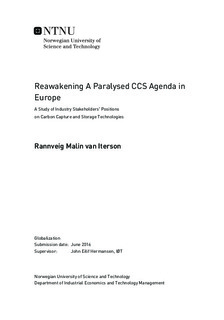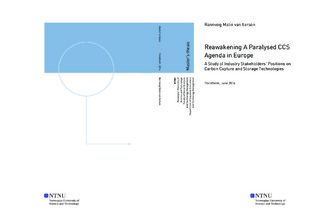| dc.contributor.advisor | Hermansen, John Eilif | |
| dc.contributor.author | van Iterson, Rannveig Malin | |
| dc.date.accessioned | 2017-03-13T08:36:26Z | |
| dc.date.available | 2017-03-13T08:36:26Z | |
| dc.date.created | 2016-06-14 | |
| dc.date.issued | 2016 | |
| dc.identifier | ntnudaim:14595 | |
| dc.identifier.uri | http://hdl.handle.net/11250/2433847 | |
| dc.description.abstract | Abstract
On the backdrop of the urgent need to combat climate change and in light of the Paris Agreement, Carbon Capture and Storage (CCS) technologies are a recognised part of the solution solving the climate puzzle. Institutions such as the Intergovernmental Panel on Climate Change, the European Union and the International Energy Agency all define CCS as a necessary climate technology to fully enable the transition towards a sustainable low-carbon society by 2050. The steel and cement industry are heavy CO2 emitters in the European Union. A large share of these CO2 emissions are unavoidable process emissions that are not associated with fuel combustion. This demands urgent action on CO2 emission abatement in industry. At the moment CCS installation has become a recognised technological solution for decarbonisation of energy intensive industries. Due to unfavourable framework conditions an almost paralysation of movement in CCS deployment is observed in the European Union.
This study investigates the relationship between industry stakeholders positions on CCS and their transition towards a sustainable low-carbon economy. It addresses a research gap by assessing the cement and steel industries positions on CCS and their identification of inadequate framework conditions currently challenging industry CCS. Furthermore the study discusses industries extended societal corporate responsibilities in a low-carbon economy in light of sustainable development. The main results indicate that industries positions on their responsibilities in a low-carbon economy are used to justify their non-engagement in large scale CCS. Industries solely recognise capturing CO2 emissions as their societal responsibility and should thus not be expected to engage in full chain CCS projects. As the needed CCS infrastructure is currently not available and unfavourable framework conditions are prevailing, the cement and steel industries associate CCS installation with unaffordable large risks. The study therefore recommends that, contrary to the polluter pays principle, public authorities should enable industries to make the necessary investments into capturing CO2. Further, public authorities should take on the task to develop the stable and predictable framework required, and initiate the construction of CO2 transport and storage capacity. | |
| dc.language | eng | |
| dc.publisher | NTNU | |
| dc.subject | Globalization, Global Politics and Culture | |
| dc.title | Reawakening A Paralysed CCS Agenda in Europe - A Study of Industry Stakeholders' Positions on Carbon Capture and Storage Technologies | |
| dc.type | Master thesis | |

